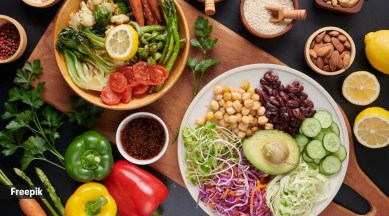Karishma Shah, Integrative Health Nutritionist, said, “The best way to ensure that all nutrient requirements are being met is by following a balanced diet that includes all the essential components like proteins, carbohydrates, fats, and micronutrients such as vitamins and minerals.”

Good nutrition is essential for maintaining optimal health and well-being. Macro and micronutrients play vital roles in the body, supporting various functions and processes. However, deficiencies in these nutrients can lead to significant health problems.
Speaking with indianexpress.com, Dr Debojyoti Dhar, Co-founder & Director, of Leucine Rich Bio, explained how macronutrients differ from micronutrients in terms of their functions and dietary requirements “As the name suggests, macronutrients such as carbohydrates, proteins, and fats are nutrients that our body needs in large amounts. They are involved in a plethora of functions. Some of these are providing energy, helping build cells and tissues, and regulating the functioning of the enzymes.”
On the other hand, he said, “Micronutrients are the nutrients that are needed in lesser quantities. Although they are needed in meagre quantities, they are equally fundamental for health. They help the body in performing various functions such as the formation of DNA, hemoglobin, insulin release, etc. Overall, they play a major role in maintaining the immune system, neurological system, and bone health besides other functions.”
You have exhausted your
monthly limit of free stories.
To continue reading,
simply register or sign in
Continue reading with an Indian Express Premium membership starting Rs 91 per month.
This premium article is free for now.
Register to read more free stories and access offers from partners.
This content is exclusive for our subscribers.
Subscribe to get unlimited access to The Indian Express exclusive and premium stories.
This content is exclusive for our subscribers.
Subscribe now to get unlimited access to The Indian Express exclusive and premium stories.
A vegetarian or vegan diet, when properly planned, can provide all the necessary macronutrients and micronutrients required for optimal health.
Dr. Dhar explained, “It is very likely for vegetarians and vegans to develop deficiencies in nutrients such as Vitamin B12, Vitamin B9, iron, and proteins. Therefore, they need to take extra care to ensure that their dietary requirements are met. This can be done by incorporating some food items into their meals.”
Explaining the same, he said, “The requirement of the body for Vitamin B12 can be met by consuming fortified soy or almond milk and yeast spreads. Vitamin B9 requirements can be fulfilled by including broccoli and green leafy vegetables in one’s diet. While chia seeds and spinach are great sources of iron, for fulfilling the protein requirement, one should include legumes, quinoa, and soy products in their meals. Vegetarians may also consume probiotic supplements such as Lactobacillus plantarum, which may aid in improving the concentration of certain vitamins in the body. Besides, maintaining a healthy gut microbiome is also a way to keep nutrient requirements in check.”
It is important to understand the characteristics and requirements of different vitamins and the potential risks associated with excessive intake.
Karishma Shah, Integrative Health Nutritionist, said, “Water soluble vitamins like B, C, and B12, disintegrate in water and need to be consumed in recommended amounts as part of the daily diet. Since excess amounts are excreted in the urine of healthy individuals, the toxicity of these vitamins is rare. It helps to support basic biological processes for the production of energy and antioxidants. Whereas A, D, E, and K are fat-soluble vitamins that can be absorbed more easily if eaten as part of a meal containing fats. Toxicity can result if excessive consumption is carried out in the form of supplements.”
“The best way to ensure that all nutrient requirements are being met is by following a balanced diet that includes all the essential components like proteins, carbohydrates, fats, and micronutrients such as vitamins and minerals. A balanced meal should consist of a variety of fruits and vegetables, yogurt, achar (pickles), dal, and lean meat like chicken or fish,” she advised.
Recently, Nutritionist Lovneet Batra shared on Instagram how you can overcome any nutrient deficiency by following a rich balanced diet.
Here are some tips shared by Batra that may help prevent these deficiencies:
*Vitamin B12: Vitamin B12 deficiency is very common, especially in vegetarians, vegans, and older adults.
How to overcome it? Include foods rich in B12 milk, chlorella, yogurt, fresh cheese. If you’re unable to meet your vitamin B12 requirements through diet alone, consider taking a vitamin B12 supplemen
*Vitamin D: Vitamin D is a fat-soluble vitamin that functions like a steroid hormone in your body. How to overcome it? Get sunlight exposure and consume vitamin D-rich foods like mushrooms, salmon, and egg yolks. Consider a supplement if recommended by a healthcare professional.
*Iodine: One of the most common nutrient deficiencies that may cause enlargement of the thyroid gland.
How to overcome it? Use iodised salt (contains iodine) in your cooking and food preparation. Include natural sources of iodine such as yogurt, dairy products, prunes.
*Vitamin A: Vitamin A deficiency can lead to various health issues, particularly affecting vision and immune function. How to overcome it? Include foods rich in vitamin A bajra, green gram dal, amaranth leaves, sweet potato, papaya, mango, and sesame seeds. Vitamin A is a fat-soluble vitamin, meaning it requires dietary fat for absorption. Ensure you consume a balanced intake of healthy fats.
???? For more lifestyle news, follow us on Instagram | Twitter | Facebook, and don’t miss out on the latest updates!
© IE Online Media Services Pvt Ltd
First published on: 04-07-2023 at 08:20 IST










